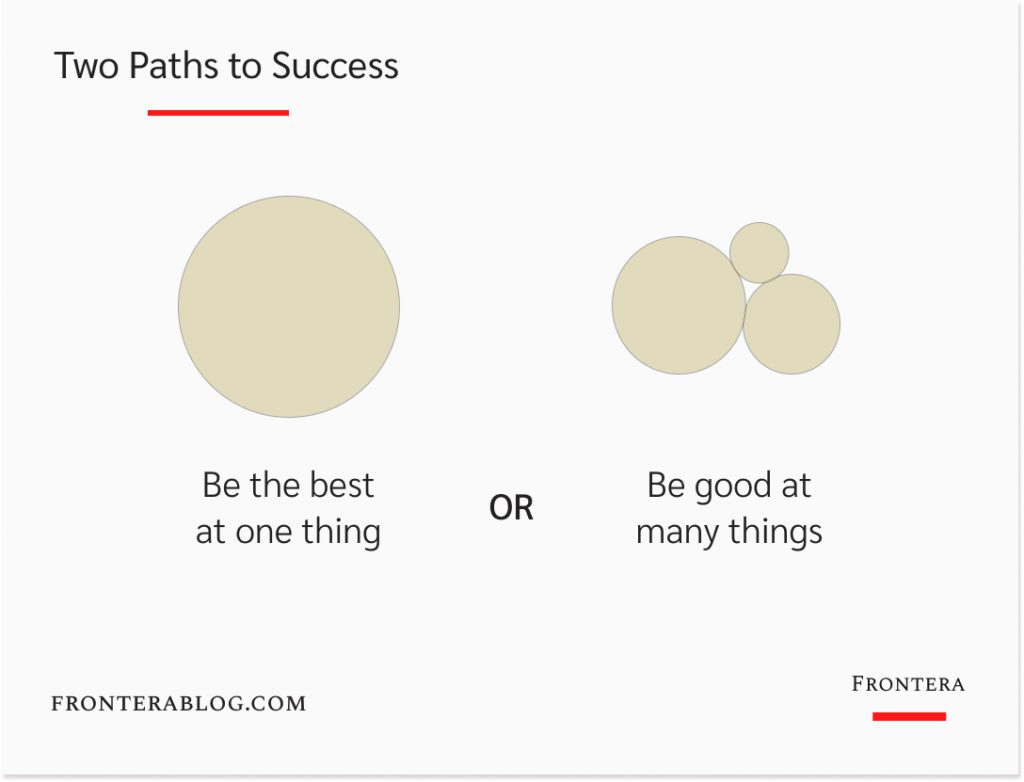Talent stacking is increasing your chances of success by becoming good at many skills, rather than trying to become the best at one. Scott Adams made the idea popular in his book How to Fail at Almost Anything and Still Win Big.
There are two paths to extraordinary success:
Be great —at one thing
It was obvious from his childhood.
Magnus Carlsen was going to be a chess legend.
He had an excellent memory, the ability to keep his focus for hours, and access to train with grandmasters from an early age.
Chess fans called him the Mozart of Chess.
When he was only 13 years old, he managed to get a draw from Garry Kasparov — one of the best players of all time.
And in the following years, predictions about his future came true. He became a grandmaster and won all major chess tournaments.
Since he became the best, he has earned good money from prizes and sponsorships.
And he turned his money and fame into more success in business. He is the second-largest shareholder of Play Magnus —a public company with a $50 million market cap that has chess apps.
Today, he is still the reigning world champion after 9 years.
Be good —but at many things
Alexandra Botez was a young and talented chess player.
She won the children’s national championship in Canada, and U.S. Girls Nationals after moving to the US.
Alexandra loved chess, but she was not delusional. She knew earning a living as a chess player was tough if you were not one of the top players.
So when she turned 18, she decided to focus on her education and went on to study international relations at Stanford.
But her passion for chess didn’t leave her. So she started streaming her games on Twitch for fun.
Viewers loved Alexandra; she was funny, likable, and good at chess. She quickly became one of the most popular chess streamers.
As she continued, she also got better at the social media game.
Today, she has more than 1.5 million followers across different platforms.
And earns more than most chess players — without even being in the top 20,000 in rankings.
Talent stacking: The easier path
Many talented and hard-working people try to become chess grandmasters, Olympic medal winners, or NBA players.
But only a few —like Magnus Carlsen— get there.
That means becoming the best at one thing is almost impossible. You could spend years and still fail.
Luckily, there is an easier way to get extraordinary success. Scott Adams calls it talent stacking.
Instead of trying to be among the top 1% in one skill, get to the top 25% in three skills.

Becoming one of the top 1% software engineers in the world is hard.
But if you combine engineering with decent public speaking and marketing skills; you become rare.
You get ahead of millions who are better at engineering.
Remember, you don’t even need to be the best public speaker or marketer. Becoming good is enough.
Alexandra Botez combined her chess skill with entertainment and social media skills; and achieved extraordinary success.
She is not the best chess player, the best entertainer, or social media creator.
But the combination of these skills made her unique.
Two points to consider for your talent stack
1. Have at least one good communication skill
Writing, public speaking, or persuasion.
Communication skills are multipliers. They work as leverage for your other skills.
So become good at least one.
2. Build an uncommon stack
Some skill combinations are common.
Sales, negotiation, and networking. Or product management and project management.
Yes, they are useful. But not unique.
Alexandra’s talent stack was rare. That’s why she became the best in the world.
So write your skills down, and think of new skills that would make your talent stack uncommon.
A new communication skill? A specific industry knowledge? Maybe personal branding?
Choose one and become good at it.
Your unique talent stack will make your success inevitable.
Enjoyed this article?
Then you’ll love the How Brands Win Newsletter.
Get the “7 Positioning Sins That Cost B2B Brands Millions” guide when you join. It’s free.
